 MyDogBreeds
MyDogBreeds Toy Mi-Ki is originated from United States but Russian Hound is originated from Russia. Toy Mi-Ki may grow 37 cm / 14 inches shorter than Russian Hound. Toy Mi-Ki may weigh 40 kg / 88 pounds lesser than Russian Hound. Both Toy Mi-Ki and Russian Hound has almost same life span. Toy Mi-Ki may have less litter size than Russian Hound. Toy Mi-Ki requires Moderate maintenance. But Russian Hound requires Low maintenance
Toy Mi-Ki is originated from United States but Russian Hound is originated from Russia. Toy Mi-Ki may grow 37 cm / 14 inches shorter than Russian Hound. Toy Mi-Ki may weigh 40 kg / 88 pounds lesser than Russian Hound. Both Toy Mi-Ki and Russian Hound has almost same life span. Toy Mi-Ki may have less litter size than Russian Hound. Toy Mi-Ki requires Moderate maintenance. But Russian Hound requires Low maintenance
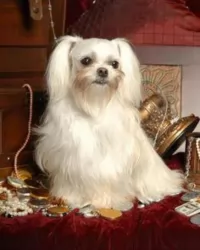 The Toy Mi-Ki is a sociable companion dog. He hasn’t got a long history, and the little bit of history there is, isn’t clear.
The Toy Mi-Ki is a sociable companion dog. He hasn’t got a long history, and the little bit of history there is, isn’t clear.
It is believed that the breed was bought about by Maureen Westburg. It was in the 1980s that she crossed several toy breeds to develop the Mi-Ki. It is thought that she gave the dog the name Mi-Ki because her name was Mikkie. It seems whe wanted a dog that came close to looking like a gremlin.
Some of the dogs used in the breeding program were the Japanese Chin, the Maltese, and the Papillon. The International Miki Registry is trying to get recognition with the United Kennel Club for this dog. There are other canine clubs and organizations that recognize the Mi-Ki Dog as a breed.
 There are sportsmen and hunters who appreciate the versatile Russian Hound. The Russian Hound has been a popular working breed in its homeland for a long time as it is an ancient dog breed.
There are sportsmen and hunters who appreciate the versatile Russian Hound. The Russian Hound has been a popular working breed in its homeland for a long time as it is an ancient dog breed.
This is an ancient dog breed, being developed by crossing common hunting dogs with indigenous ovcharkas and Laikas. Later European hunting dogs were also introduced into the mix.
The dogs numbers have declined but were later revived in the late 1800s. The first breed standard for the Russian Hound was created in 1896. Known as the Russkaya Gontchaya, this tough dog is still popular in all parts of Russia.
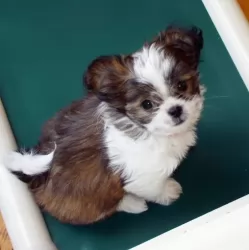 The small Toy Miki stands at between 25 cm – 30 cm in height and weighs between 2 – 5kg. You get two different coat types – long and short and the long-haired variety also has quite a bit of hair around the face.
The small Toy Miki stands at between 25 cm – 30 cm in height and weighs between 2 – 5kg. You get two different coat types – long and short and the long-haired variety also has quite a bit of hair around the face.
His longish coat is low-shedding which makes him popular for people who battle with allergies. The Miki Dog will produce about 2 – 4 puppies.
As a toy dog, he has a domed head with large eyes. Their ears are feathered and are carried erect and the tail is long and feathered.
These little dogs are popular companion dogs and they’re intelligent and loving, making the ideal pet for anyone.
It’s a friendly dog and yet he will bark to alert you of an intruder. Youll take notice because he isn’t the kind of dog that just yaps away.
Children love them and they make great playmates for children who have been taught to be kind and gentle with animals.
Their small size and their adaptable nature make them suitable for city or country living. Sweet and amicable, the social purebred Toy Mi-Ki is everything you want in a companion.
He is loyal and devoted, calm and adaptable. They’re not the kind of dogs to go jogging with you, but nonetheless, he will still need his exercise – walks every day as well as ball games.
 The Russian Hound is a medium to large sized dog. He stands at roughly 62 – 67cm in height and weighs roughly 36 to 45kg. The dog however is available in a number of different sizes.
The Russian Hound is a medium to large sized dog. He stands at roughly 62 – 67cm in height and weighs roughly 36 to 45kg. The dog however is available in a number of different sizes.
The coat is fairly short and dense, becoming fuller in Winter. The coat color is fawnish with a darker brown, blackish saddle on the back. The paws have some white markings. The eyes are medium length and the tail is long and held down.
The Russian Hound is a peaceful, calm dog, not making a fuss around strangers, but accepting them well. He may be calm, but he is independent and strong willed.
Training and socialization will be good for him, making him obedient and well mannered.
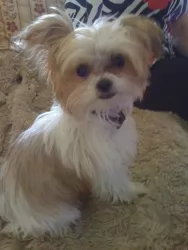 The Mi-Ki is calm and good-natured, and because of his cuteness, he can’t help but become a lap dog, if you allow him.
The Mi-Ki is calm and good-natured, and because of his cuteness, he can’t help but become a lap dog, if you allow him.
He is social and just loves human companionship. He is friendly too and will quite happily be friends with children and pets in the home.
Make sure he is trained and socialized so that you become one of the many people who have nothing but good things to say about this sweet little dog.
 Everybody wants a peaceful, loving dog that can be a good pet and companion without causing a lot of trouble. The Russian hound is a peaceful, loving, loyal dog who is going to make any family a wonderful 4-legged fried.
Everybody wants a peaceful, loving dog that can be a good pet and companion without causing a lot of trouble. The Russian hound is a peaceful, loving, loyal dog who is going to make any family a wonderful 4-legged fried.
He can adapt to life in the city or the countryside so long as he is given a good loving home and plenty of exercise.
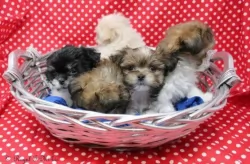 You just have to bear in mind, that because of his short muzzle, he is prone to respiratory problems. Too much exercise and you may find him huffing and puffing. Be careful on a hot day.
You just have to bear in mind, that because of his short muzzle, he is prone to respiratory problems. Too much exercise and you may find him huffing and puffing. Be careful on a hot day.
Also, little dogs like this often have all kinds of dental problems. When you brush him, check his teeth because he can’t tell you if he has a rotten tooth causing him a lot of pain and misery.
Check his eyes too that they are bright and clear and check the inside of his ears. Hypothyroidism and eye issues can also bother the Mi-ki.
 The Russian Hound is a healthy breed. Nonetheless even the healthiest dog breeds can become ill.
The Russian Hound is a healthy breed. Nonetheless even the healthiest dog breeds can become ill.
Good food, exercise and lots of love and attention can ensure a long life for him.
However every dog can have one of the many common dog illnesses there are. Toothache can be a serious problem for your pet because if you don’t look in his mouth you won’t be able to tell if he has a bad, painful tooth.
Dogs can also break their teeth, causing sharp, jutting pieces which cut the gums. They can also get gum disease. Plaque can cause a whole lot of bacteria in your pets mouth. With the increase in bacteria, your dog’s health problems increase too. It is imperative to look in your pets mouth and speak to your vet about canine dental maintenance.
Eye infection are a common problem with dogs, and an eye infection can be from allergies. Yellow pus can indicate an infection. It is best to speak to your vet because some eye infections can lead to blindness if left untreated.
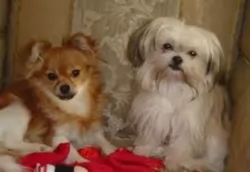 Considered to be low-shedding, the Mi-Ki will benefit from a brush once or twice a week.
Considered to be low-shedding, the Mi-Ki will benefit from a brush once or twice a week.
Some people take their Mi-Ki’s to have their hair professionally cut. This is a good move because then the ears, teeth, and nails are attended to as well.
You can do all of these things at home yourself, but sometimes, particularly with the long-haired Miki, the matting of the hair can make it that you rather send him to professional groomers.
Like all dogs, the Mi-Ki dog will need nutritious food if he is to stay healthy. He isn’t a big eater and you will find the perfect food for your small canine pet.
Read on the packaging to make sure you get high-quality dry food for small dogs. You want the ingredients to be as natural as possible without any toxic colorants and additives.
Meat and protein must always be the top ingredients. Try to provide some home-made food too. Boiled chicken, brown rice, spinach, and sweet potatoes can be chopped up finely and a small portion added occasionally to the dry kibble as a tasty treat.
 As a hunting dog, you will need to ensure your Russian Hound gets enough exercise. He will love his walks with you but will want to be let off his leash when in the park. He loves the opportunity to run free. Games at home in the garden will also be good for this large dog.
As a hunting dog, you will need to ensure your Russian Hound gets enough exercise. He will love his walks with you but will want to be let off his leash when in the park. He loves the opportunity to run free. Games at home in the garden will also be good for this large dog.
Provide your pet with a nice, warm, dry sleeping area.
Make sure your pet’s vaccines are up to date.
Have your dog neutered or spayed to prevent unplanned puppies.
Groom your Russian Hound by brushing him twice a week.
Check him over for lumps while brushing him.
Check inside his ears for signs of redness.
Trim his nails.
Look at his eyes and make sure they are clear with no signs of discharge.
Check inside the mouth for rotten or bad teeth as this can cause tremendous pain and also cause toxins to get into the bloodstream.
The Russian Hound relies on vitamin and mineral enriched food. The best commercially manufactured dog foods can provide this. These foods are wonderfully convenient. Try not to give your dog dry kibble day after day, but vary it twice a week with some home-made food.
Simply add into one big pot chicken, brown rice or pasta and spinach, sweet potatoes and carrots. This food can all be chopped up and added in to the dry kibble twice a week. It is wonderfully tasty for your your canine friend. Dogs thrive on simple, consistent meals. Ty and add some raw meat to his food occasionally.
Ensure there is always a bowl of fresh, cool water within his reach.